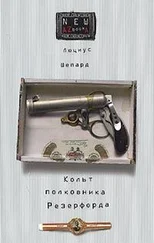Before he could feel relief or surprise or any way absorb what had happened, Gracela tried to pull free. Mingolla got to his knees, dragged her down and dashed her knife hand against the bridge. The knife skittered away. Gracela struggled wildly, clawing at his face, and the other children edged forward. Mingolla levered his left arm under Gracela’s chin, choking her; with his right hand, he picked up the knife and pressed the point into her breast. The children stopped their advance, and Gracela went limp. He could feel her trembling. Tears streaked the grime on her cheeks. She looked like a scared little girl, not a witch.
“Pitta! “ said the boy. He had come to his feet, holding his shoulder, and was staring daggers at Gracela.
“Is it bad?” Mingolla asked. “The shoulder?” The boy inspected the bright blood on his fingertips. “It hurts,” he said. He stepped over to stand in front of Gracela and smiled down at her; he unbuttoned the top button of his shorts. Gracela tensed.
“What are you doing?” Mingolla suddenly felt responsible for the girl.
“I going to do what I tol’ her, man.” The boy undid the rest of the buttons and shimmied out of his shorts; he was already half-erect, as if the violence had aroused him.
“No,” said Mingolla, realizing as he spoke that this was not at all wise.
“Take your life,” said the boy sternly. “Walk away.” A long powerful gust of wind struck the bridge; it seemed to Mingolla that the vibration of the bridge, the beating of his heart, and Gracela’s trembling were driven by the same shimmering pulse. He felt an almost visceral commitment to the moment, one that had nothing to do with his concern for the girl. Maybe, he thought, it was an implementation of his new convictions.
The boy lost patience. He shouted at the other children, herding them away with slashing gestures. Sullenly, they moved off down the curve of the bridge, positioning themselves along the railing, leaving an open avenue. Beyond them, beneath a lavender sky, the jungle stretched to the horizon, broken only by the rectangular hollow made by the airbase. The boy hunkered at Gracela’s feet. “Tonight,” he said to Mingolla, “the bridge have set us together. Tonight we sit, we talk. Now, that’s over. My heart say to kill you. But ’cause you stop Gracela from cutting deep, I give you a chance. She mus’ make a judgmen’. If she say she go wit’ you, we”—he waved toward the other children—“will kill you. If she wan’ to stay, then you mus’ go. No more talk, no bullshit. You jus’ go. Understan’?”
Mingolla wasn’t afraid, and his lack of fear was not born of an indifference to life, but of clarity and confidence. It was time to stop reacting away from challenges, time to meet them. He came up with a plan. There was no doubt that Gracela would choose him, choose a chance at life, no matter how slim. But before she could decide, he would kill the boy. Then he would run straight at the others: without their leader, they might not hang together. It wasn’t much of a plan and he didn’t like the idea of hurting the boy; but he thought he might be able to pull it off. “I understand,” he said.
The boy spoke to Gracela; he told Mingolla to release her. She sat up, rubbing the spot where Mingolla had pricked her with the knife. She glanced coyly at him, then at the boy; she pushed her hair back behind her neck and thrust out her breasts as if preening for two suitors. Mingolla was astonished by her behavior. Maybe, he thought, she was playing for time. He stood and pretended to be shaking out his kinks, edging closer to the boy, who remained crouched beside Gracela. In the east a red fireball had cleared the horizon; its sanguine light inspired Mingolla, fueled his resolve. He yawned and edged closer yet, firming his grip on the knife. He would yank the boy’s head back by the hair, cut his throat. Nerves jumped in his chest. A pressure was building inside him, demanding that he act, that he move now. He restrained himself. Another step should do it, another step to be absolutely sure. But as he was about to take that step, Gracela reached out and tapped the boy on the shoulder.
Surprise must have showed on Mingolla’s face, because the boy looked at him and grunted laughter. “You t’ink she pick you?” he said. “Shit! You don’ know Gracela, man. Gringos burn her village. She lick the devil’s ass ‘fore she even shake hands wit’ you.” He grinned, stroked her hair. “’Sides, she t’ink if she fuck me good, maybe I say, ‘Oh, Gracela, I got to have some more of that!’ And who knows? Maybe she right.”
Gracela lay back and wriggled out of her skirt. Between her legs, she was nearly hairless. A smile touched the corners of her mouth. Mingolla stared at her, dumbfounded.
“I not going to kill you, gringo,” said the boy without looking up; he was running his hand across Gracela’s stomach. “I tol’ you I won’ kill a man so close wit’ death.” Again he laughed. “You look pretty funny trying to sneak up. I like watching that.”
Mingolla was stunned. All the while he had been gearing himself up to kill, shunting aside anxiety and revulsion, he had merely been providing an entertainment for the boy. The heft of the knife seemed to be drawing his anger into a compact shape, and he wanted to carry out his attack, to cut down this little animal who had ridiculed him; but humiliation mixed with the anger, neutralizing it. The poisons of rage shook him; he could feel every incidence of pain and fatigue in his body. His hand was throbbing, bloated and discolored like the hand of a corpse. Weakness pervaded him. And relief.
“Go,” said the boy. He lay down beside Gracela, propped on an elbow, and began to tease one of her nipples erect.
Mingolla took a few hesitant steps away. Behind him, Gracela made a mewling noise and the boy whispered something. Mingolla’s anger was rekindled—they had already forgotten him!—but he kept going. As he passed the other children, one spat at him and another shied a pebble. He fixed his eyes on the white concrete slipping beneath his feet.
When he reached the midpoint of the curve, he turned back. The children had hemmed in Gracela and the boy against the terminus, blocking them from view. The sky had gone bluish-gray behind them, and the wind carried their voices. They were singing: a ragged, chirpy song that sounded celebratory. Mingolla’s anger subsided, his humiliation ebbed. He had nothing to be ashamed of; though he had acted unwisely, he had done so from a posture of strength and no amount of ridicule could diminish that. Things were going to work out. Yes they were! He would make them work out.
For a while he watched the children. At this remove, their singing had an appealing savagery and he felt a trace of wistfulness at leaving them behind. He wondered what would happen after the boy had done with Gracela. He was not concerned, only curious. The way you feel when you think you may have to leave a movie before the big finish. Will our heroine survive? Will justice prevail? Will survival and justice bring happiness in their wake? Soon the end of the bridge came to be bathed in the golden rays of the sunburst; the children seemed to be blackening and dissolving in heavenly fire. That was a sufficient resolution for Mingolla. He tossed Gracela’s knife into the river and went down from the bridge in whose magic he no longer believed, walking toward the war whose mystery he had accepted as his own.
At the airbase, Mingolla took a stand beside the Sikorsky that had brought him to San Francisco de Juticlan; he had recognized it by the painted flaming letters of the words Whispering Death. He rested his head against the letter G and recalled how Baylor had recoiled from the letters, worried that they might transmit some deadly essence. Mingolla didn’t mind the contact. The painted flames seemed to be warming the inside of his head, stirring up thoughts as slow and indefinite as smoke. Comforting thoughts that embodied no images or ideas. Just a gentle buzz of mental activity, like the idling of an engine. The base was coming to life around him. Jeeps pulling away from barracks; a couple of officers inspecting the belly of a cargo plane; some guy repairing a fork-lift. Peaceful, homey. Mingolla closed his eyes, lulled into a half-sleep, letting the sun and the painted flames bracket him with heat real and imagined.
Читать дальше






